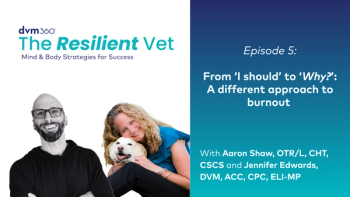
Check your balance: Discovering what motivates you as a veterinarian
It's easy to lose sight of why we got into the veterinary profession. But we can get our vision back.
When you start to feel burned out or unmotivated at work, take a minute to check in with yourself and ask, "Why do I want to be a veterinarian?" In Clayton Christenson's new book, How Will You Measure Your Life? (Harper Business, 2012), he discusses the factors that influence people's motivation in the workplace and the importance of receiving the right stimulation to lead to improved performance—advice I found myself thinking more than a few veterinarians would benefit from.
The thing is, it's possible to love your job and hate it at the same time. There are two types of factors that determine this: tangible factors and motivation factors. Tangible factors are things like compensation, benefits, job title, security and supervisory styles. A lack of tangible factors will cause dissatisfaction. Improved tangible factors will reduce dissatisfaction but they won't always lead to satisfaction. Instead they'll produce a neutral state of mind. All the salary increases and benefits in the world won't make you love what you do. You just won't hate it as much.
GETTY IMAGES
Why do you love your job? These are the motivation factors. Motivators are internal—what's inside you and inside your work. They're about what's truly meaningful and keeps you loving what you do. These are the things you'd truly miss if you had to give them up. In the book Don't Retire, Rewire! (ALPHA, 2007), authors Jeri Sedlar and Rick Miners refer to these factors as "drivers."
When I ask veterinary healthcare providers what their drivers are, it sometimes takes a few minutes to get to the core issues. They talk about enjoying practice, but when I ask them to hone in on what they enjoy it's as if they've never really thought about it. They have to remember that it's about loving animals, solving problems, dealing with science, helping people and making a difference in the community. Rarely is financial reward very high on the list. Yet frequently, job selection (note: I'm not saying "life's work") is dictated by compensation.
Go back to when you applied to veterinary school and had to write that standard "why I want to be a veterinarian" essay. Even considering the heavy debt loads veterinarians incur, few say they're in it for the money. "I want to have a career that allows me to ... " doesn't usually end with " ... and drive a Mercedes." Unfortunately, reality often rears its head and things like student debt, family responsibilities and even ego lead us to accept the most lucrative offer, thinking, "As soon as I [fill in the blank], I'll do what I really love the way I want to do it." In the meantime, we lose sight of our desire to help animals or people.
Even if we don't lose sight of these things, we can begin to resent veterinary practice because we aren't doing it the way we always envisioned. It's too easy for veterinarians to fall out of love with practice because we're still focused on what we once said were the wrong things. We often tend to lose sight of our main drivers—which are our truest motivators.
According to Christenson, we need to ask ourselves a new set of questions. Is this work meaningful? Will I be able to grow from it? Am I going to learn? Is there recognition? Do I make a real difference in my community?
Veterinarians are fortunate in that the answer is generally "yes." These are the motivators, drivers and internal rewards that, if given enough financial wherewithal, we can go back to and remember why we want to be veterinarians. This is what we need to help us revist, renew and refocus our professional priorities.
Dr. Michael Paul,
Newsletter
From exam room tips to practice management insights, get trusted veterinary news delivered straight to your inbox—subscribe to dvm360.






